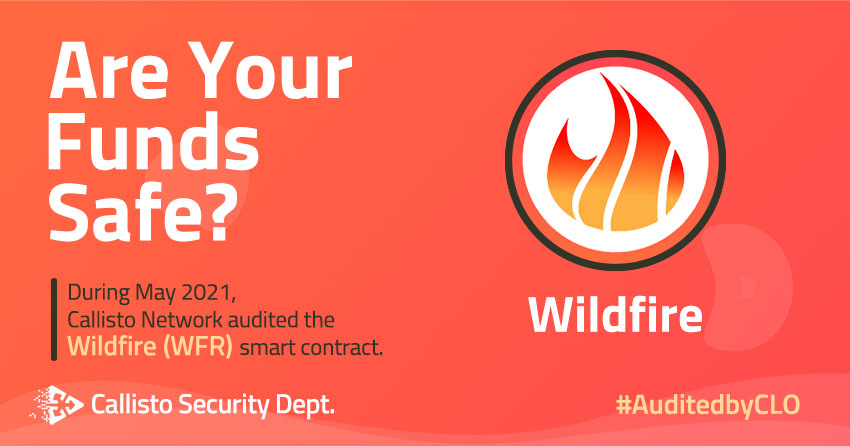Wildfire token security audit, conducted by the Callisto Network Security Department during May 2021.
Wildfire Token Security Audit Report
Are Your Funds Safe?
Audit request
Wildfire (WDF) Token smart contract security audit report performed by Callisto Security Audit Department.
- Telegram: https://t.me/WildfireOfficial
- Website: https://wildfire-coin.com/
Source code
https://github.com/Wildfire-new/Wildfirebeb20/blob/main/wildfire.sol
Disclosure policy
… Do you want us to publish the report as it is or to notify you privately in case of finding critical mistakes? … Yes.
… provide your conditions for publishing the report or leave only standard disclosure policy link … Yes.
Contact information
Platform
BSC.
1. In scope
https://bscscan.com/address/0x6218352Cc511A86F154fe03F69B0aa062e01aeA9#contracts
1.1 Excluded
The correctness of the mathematical calculations was not verified during the audit due to the lack of complete documentation of what the contract should do and under what conditions.
2. Findings
In total, 4 issues were reported including:
- 2 medium severity issues.
- 1 low severity issue.
- 1 owner privilege.
2.1 Known vulnerabilities of ERC-20 and BEP-20 token
Severity: low.
Description:
- Lack of transaction handling mechanism issue. WARNING! This is a very common issue and it already caused millions of dollars losses for lots of token users! More details here.
Recommendation
Add the following code to the transfer(_to address, ...) function:
require( _to != address(this) );
- ERC20 is a widely used standard across the Ethereum ecosystem. It is reasonable to assume that ERC20 tokens could be “accidentally” deposited into this contract even though it is not intentional.
Every user on the entire Ethereum ecosystem can send ERC20 tokens to this contract and he will have no ability to extract it back unless there is a special “ERC20-rescue” function implemented in your contract. It is advised to implement this function.
Example: here is BAT contract address. As you can see the contract itself holds $497,000 worth of different ERC20 tokens – all these tokens are permanently “stuck” inside the contract and therefore uselessly lost.
Recommendation
A simple “ERC20-rescue” function can solve the problem.
function rescueERC20(address _token, uint256 _amount) external onlyOwner {
IERC20(_token).transfer(owner(), _amount);
}
2.2 Function includeInReward() waste a Gas and has a risk of OUT_OF_GAS exception.
Severity: medium.
Description:
The function includeInReward()(lines 400-411) use the loop for() to find and remove address from the _excludedFromReward list. It requires a lot of Gas if many addresses are excluded. In the case of the long excluded list, the function will be aborted with OUT_OF_GAS exception.
Recommendation
Use EnumerableSet instead of address array (line 204). So you could remove record using function remove().
2.3 Function _getCurrentSupply() has a risk of OUT_OF_GAS exception
Severity: medium.
Description:
The function _getCurrentSupply()(lines 361-371) use the loop for()(lines 364-368) to calculate reflectedSupply and tokenSupply values. In the case of the big length of _excludedFromReward list, this function will be aborted with OUT_OF_GAS exception. Since this function used in most other functions, the performance of the entire contract will be broken.
The risk becomes a higher due Gas cost of storage reading that may grow in future node updates. For example, after applying the EIP-1884 the cost of the SLOAD (0x54) operation changes from 200 to 800 gas. And in EIP-2929 discussing to increase the gas cost of SLOAD (0x54) to 2100.
This means that even if with current _excludedFromReward list length contract works now, it may stop works in the future when the cost of storage reading will change.
Recommendation
- Try to avoid long loops.
- Add limitation of
_excludedFromRewardlist growing into functionexcludeFromReward()(lines 391-398):
require(_excludedFromReward.length < 50, "Excluded list too long");
2.4 Owner privileges
Severity: owner privileges.
Description:
- Owner can include (line 400) and exclude (line 391) any account to/from reward.
- Owner can include (line 387) and exclude (line 382) any account to/from fees.
3. Conclusion
The audited smart contract must not be deployed. Reported issues must be fixed prior to the usage of this contract.
Appendix
Smart Contract Audits by Callisto Network.
Miscellaneous
Our Most Popular Audit Reports.
Trust the Blockchain, Audit the Smart Contracts.
Follow Callisto’s Security Department on Twitter to get our latest news and updates!

